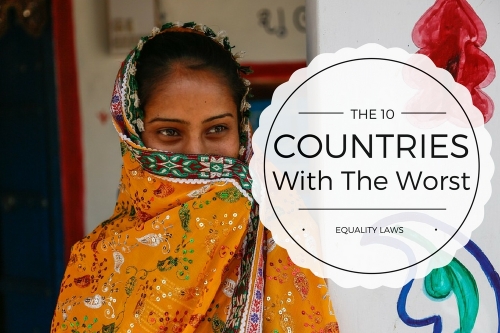As we race through the 21st century, equality and human rights are gaining more prominence all over the world. The federal governments of most developed nations across the globe are taking steps to make sure that all their citizens are treated fairly. Laws are the most formal expression of a country’s beliefs and policies. Various nations are therefore making strides in trying to ensure that their laws, rules, and regulations are fair to people from all walks of life.This means that everyone is treated in the same way by the law, regardless of their race, nationality, religion, age, gender, occupation, social status, physical ability and sexual orientation.
For decades now, many developed countries have been making a lot of progress in terms of gender equality as their female citizens today are given equal rights to be free, be educated, vote, earn, stand for elections, get married or divorced and feel safe. Unfortunately, in spite of the efforts made by several global law enforcement bodies, gender inequality still remains a major concern around the world. This problem goes way beyond lower paychecks and fewer opportunities at work. In fact, it is almost like the turn of the century hasn’t arrived yet for a majority of the 3.3 billion female occupants of the planet. Women are still treated like second class citizens in certain places and are openly subject to violence, repression, enforced ignorance, isolation, and other similar forms of discrimination.
So before you pack your bag and move to your next expat destination, you may want to check if the judicial system of that country treats people of both genders equally. You may be also surprised to hear about some of the places where the rules are not the same for men and women, because a couple of them have become fairly popular expat spots. Read on to know about the ten countries with the worst gender equality laws in the world.

It may come as a surprise to many people, considering that education level for the female population in Jordan is equal to, if not higher than, the male population. Unfortunately however, the women in this country aren’t given equal economic opportunities or participation rights. According to the World Bank unemployment among Jordanian women is more than double than that of the men.
Fortunately, conditions for the female population have improved significantly in the last few decades. Today, women can travel freely without being escorted by their male relatives or seeking permission from their husbands or fathers. According to the electoral law that was updated in 2012, women are legally guaranteed 15 of the parliament’s seats. The positive change has been brought about to a great extent by Queen Rania Al Abdullah, who is a very active advocate of women’s empowerment within Jordan and overseas. On the other hand, honor killings and domestic violence take place regularly.
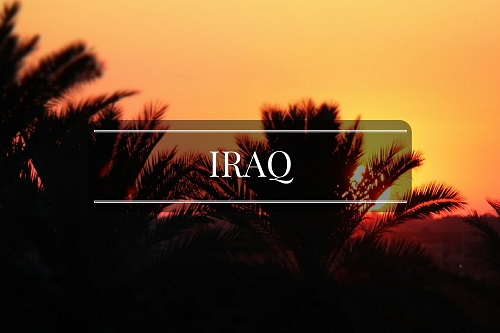
Women make up almost 65% of the Iraqi population and should therefore be treated as a vital part of the culture. However, this place still remains a completely male-dominated society.
Before the US invaded this nation to liberate it from their then dictator, Saddam Hussein, Iraq had the highest literacy rates in the Arab world for the male and female population. The country’s 2005 constitution stated that a quarter of the government positions and parliament seats need to be reserved for women. Unfortunately, since then, the conditions for women have worsened a great deal as they are now imprisoned by a blaze of sectarian conflict and violence.
Girls and young women aren’t allowed to go to school as they fear the risk of rape and kidnapping. Women who used to be employed before liberalization are now forced to stay home for the same reason. As a result, more than a million women have been displaced from their jobs and homes. There are another million widows that cannot earn enough to feed themselves and their families.
Since the offenders aren’t strictly punished by the law, they openly target girls and women who try to move about freely in the society. There are no laws that focus on domestic violence against women. The influence of religious institutions is rampant and this means that women are often forced to wear veils, even if they don’t really want to.

When the well-educated women of Egypt actively participated in Cairo’s protest at Tahrir Square, they fell victim to sexual assault and even rape. After that, in May 2013, the government established a department to investigate violence against women in response to the complaints received. This was around the same time Egypt was ranked as the “worst country for women” out of 22 nations in the Arab world. In 2014, a reformed constitution explicitly guaranteed gender equality. Unfortunately, the laws protecting women’s rights have not been reinforced at all.
Social activists fighting for women’s rights claim that the country’s law system is the real enemy of the female population. For example, polygamy is legal only for men. Men don’t even get arrested (let alone tried) for spousal rape. Women are only allowed to inherit half of what men do. A pregnant woman cannot get an abortion even if it causes risk to her life, unless she has her husband’s consent.
Moreover, a new law called Khula was introduced, where a woman could file for a divorce on no specific grounds. However, is such cases, she would have to forfeit all her financial rights and return the dowry and gifts her husband had given while contracting the marriage. A man however, can divorce his wife on no grounds, without even having to go to court.
Crimes against women including sexual harassment, domestic violence and female genital mutilation are rampant across the country and the offenders are rarely punished. Men can literally murder their wives or daughters and walk free.
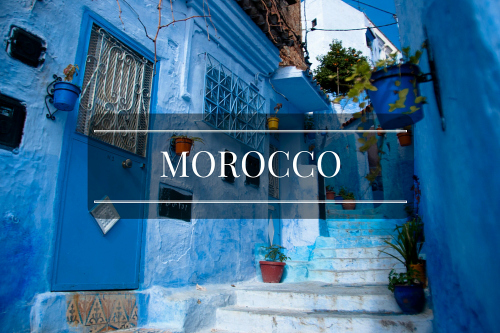
After its independence from France in 1956, the women of Morocco were at the forefront of artistic expression and knowledge production. Many of them went on to become popular artists and published authors. Unfortunately, since then things have changed a great deal and this nation is now home to a completely male-dominated society.
Today, women from other countries traveling to Morocco are often advised to exercise caution as they are likely to experience different degrees of sexual harassment almost everywhere they go. The law won’t even intervene except in very serious cases. Unfortunately, the local women are subject to this treatment on a regular basis.
In the recent past, human activists around the world were in an uproar when a 16-year-old girl was forced by the law to marry her alleged rapist. After she killed herself, Morocco’s Article 475 came into the limelight. This article actually protects rapists from prosecution if they marry their victims. This is only the tip of the iceberg.
Another law that is unfair to female citizens is the “family law”, where sons inherit about double of what the daughters do. In 2011, Morocco passed a new constitution that guaranteed gender equality. Most of the judges though are unaware of this law or will look for loopholes in the case so that the male members benefit more than the female ones.
There has been a significant improvement in the number of child marriages taking place in Morocco. However, even today, around 16% of Moroccan girls are married off before the age of 18. Several judges are known to authorize marriages for child brides in certain circumstances.

Historically, the women in Oman were kept out of the forums of everyday life. However, things changed in the 1970s, when the then contemporary Omanis were influenced by British colonial values and challenged several traditions of gender segregation. Women were then allowed to pursue their education, professional training and careers. The movement from household confinement to the public sphere was gradual. In several ways, Oman was regarded as the pioneer of women’s rights among the Gulf countries.
A decade later, the government began to retract some of the liberties it had previously deemed “gender acceptable” for women. The number of female professionals decreased and they were forced into the more traditional roles of caregivers and nurturers.
Today, Omani women are seen as wives and mothers first. They make up only about 30% of the local workforce. Fortunately, there are several women serving in ministerial positions, which include the ministers for tourism, higher education and social development.
Omani laws permit men to take on another wife without even informing the first one and many of them abuse this right. Women on the other hand aren’t given the same liberty.

When it comes to offering equal educational opportunities to citizens of both genders, Qatar fares quite well. However, women find it difficult to get jobs even if they are more qualified than their male counterparts. This is glaringly evident in the fact that there is only one woman serving on the Central Municipal Council and one woman in a Ministerial position. While the country’s economic participation is on the rise, the gender pay gap has widened considerably.
Unlike some of the other more conservative Arab countries, Qatar allows its female citizens the right to move out and to drive without a male companion.
Ancient traditions have a strong foundation in Qatar’s customs and laws. Women, even expatriates, are not permitted to dress in revealing clothes or in a manner that may be considered provocative. This means that they aren’t allowed to wear shorts, sleeveless blouses, halter tops and skirts. Women who don’t dress modestly may be subject to some amount of verbal abuse and even sexual harassment.
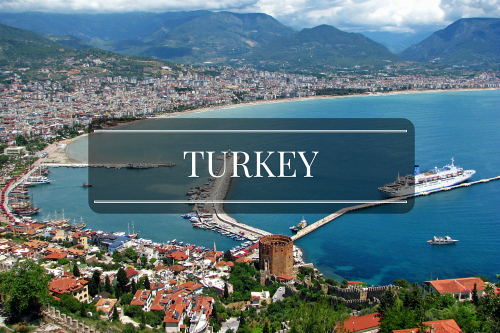
This was the first Muslim-majority nation that formed a secular state, offering its female citizens the right to vote. However, in November 2014, the then President Recep Tayyip Erdogan publicly declared “men and women are not equal; it is against nature”. Unfortunately, this is the ingrained attitude with most of the law enforcement authorities within the country.
The constitution states that the laws in Turkey don’t discriminate on the basis of gender and that all are guaranteed equality. However, women face several layers of discrimination when it comes to protection against violence, the right to choose their own spouse and the right to employment. Child marriage is still a common practice and around 35% of all the marriages in the country involve girls that are under the legal age. In the rural parts of southeastern Turkey, this figure can go up to 75%.
Since 2006, domestic violence against women has reached epidemic proportions as around 300 to 400 Turkish women are killed by their husbands or partners each year.

The Republic of Chad is a landlocked country located in Central Africa. Due to several factors, the women outnumber the men in this nation, especially in the rural areas. Yet they are not treated as equals; men have all the power and the women are given only a few rights.
Around 60% of the Chadian female population has been subject to genital mutilation, probably at a very young age. The law does not intervene as this practice is regarded as a traditional rite of passage for a girl that moves to adulthood.
A majority of the women in Chad have never been to a school, simply because it is culturally less important for girls to receive education. Young girls are often kept at home and are trained to master housework.
There is no proper law enforcement when it comes to child marriages; little girls aged 11 and 12 are married off to much older men by the male members of their families. Many of them die at a young age because of violence, rape, pregnancy and childbirth.
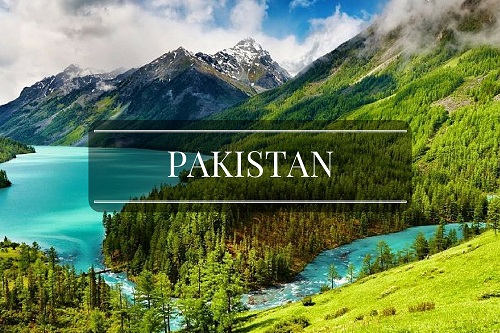
The United Nations Gender Inequality Index placed Pakistan at 147 in a list of 188 nations, as it fared very poorly in terms of women’s education, health, economic status and political empowerment. While the constitution of this country claims to bestow equal right upon both genders, women in Pakistan face many challenges in society. Moreover, they face a slower court judicial system in order to get justice.
The country is heavily influenced by a patriarchal society along with a strong feudal system, under which women are treated like domestic property.
In several parts of the country education isn’t considered important for girls, and literacy among the female population is therefore only at 39.6% compared to 67.7% in males.
Studies conducted by a women’s NGO in the country showed that each day, 6 women are murdered, 6 are kidnapped, 4 are raped and 3 kill themselves. These statistics don’t include dowry-related violence and acid attacks, which are also very common.
While the government has proposed several laws to improve the state of things for women, they have all been shot down by religious and political figures.
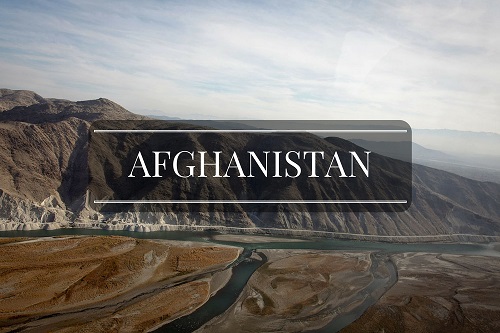
The average life expectancy of the female population in Afghanistan is only 45 years, which is very low as compared to the world average. This is because women are constantly subject to violence and repression. They do not have the right to education, and rape victims are often forced by the law to marry their rapists. Almost 50% of all the marriages involve girls under the age of 16, while the law enforcers look the other way.
Other countries where gender inequality is evident even in the laws include India, Nepal, Guatemala, Korea, Algeria, Saudi Arabia, Syria, Mali, Iran, Lebanon, Indonesia, Malaysia, Sudan, Libya and Ivory Coast, to name a few.

